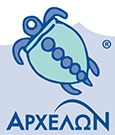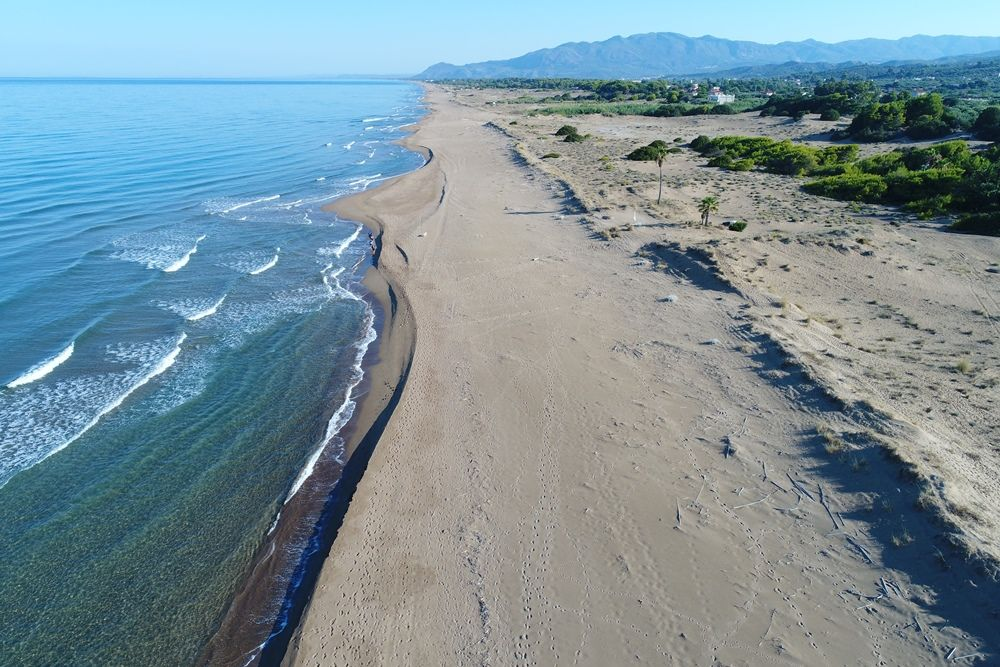Overview
Since 1983, ARCHELON has been conducting annual summer field projects in the area, aiming to record data relating to the turtles’ nesting activity as well as protecting the nests. The core area of the project is on a beach 10km long in the southern part of the Bay of Kyparissia, between the estuaries of Neda and the village of Kalo Nero. A significant and increasing number of nests, however, are also found in the northern part of the Bay, which lies north of the estuary of Neda until Alphios river. See the results of ARCHELON's actions in Kyparissia Bay here.
This magnificent beach is bordered by a coastal forest of pine trees and the largest zone of sand dunes in Greece along the upper part of the beach, and the blue waters of the Ionian Sea at the front.
Duties
From May to late September every year, volunteers of all ages and backgrounds from all over the world participate in ARCHELON’s sea turtle conservation program in Kyparissia. The activities vary depending on the season (i.e. nesting season: mid-May through mid-August and hatching season: mid-July through late September), and include the following:
- ‘Patrolling’ the beaches every day (Morning observation- average duration time 5:00-12:00), during which loggerhead reproductive activity is recorded.
- Night ‘Patrolling’ (Night observation - average duration time 22:00 - 4:00), including measuring and tagging the nesting females.
- Protecting the nests in site (with ‘fencing’) from both human activity and/or predation by mammals, and relocation of nests, when necessary.
- Constructing special ‘shading’ structures to guide hatchlings to the sea in areas where artificial light (from roads, shops, etc) may disorient the hatchlings when they emerge from the nest.
- Excavating nests after the hatchlings have emerged, in order to estimate the hatching success.
- Increasing public awareness of both tourists and local residents by operating a seasonal information station in Kalo Nero village, manning information tables, and organizing presentations at tourist facilities.
- “Patrolling” the beaches during the day to raise bathers’ awareness of the importance of the nesting beaches.
- Driving, maintaining equipment, maintaining the camp and its facilities (i.e. cleaning, etc.) and various jobs such as painting and carpentry. Artistic skills such as drawing and photography can also be quite useful.
- Following the protocol for dealing with injured or dead sea turtles, if necessary.
Free time
During your free time, there are several beautiful places to visit in the area: the Neda waterfalls (near the village of Platania) are located within an hour’s drive from the ARCHELON Field Station.Once there, you can walk in the shade of huge plane trees and oaks along the riverbanks, and swim in the Neda river. Another short trip will take you to one of the most important cultural sites of Greece: the archaeological site of Ancient Olympia, which was the sanctuary of Zeus and birthplace of the Olympic Games. On the way to Olympia, just half an hour away from the camp site, you can visit Kaiafas Lake. There, the combination of forest, lake, sea and thermal healing baths definitely makes the area a unique place to visit!
Accommodation
Volunteers will live in the campground designated by ARCHELON for the duration of their participation in the Project.
The ARCHELON Research Field Station in Kyparissia is based at Apollo Village, a well-organized campground located right next to the beach in Gianitsochori village.
Volunteers must be prepared to take part in a communal life, and to live and work in both populated and secluded areas, often as members of small teams and usually under harsh conditions. Although relevant experience is not necessary, the ability to live and co-operate with people of different cultures and backgrounds is essential.
Campground facilities:
- WC
- shower
- kitchen with basic equipment
- a taverna (restaurant)
- café
- a very warm and friendly atmosphere
Dates, participation fee and other costs
Sea turtles come into the bay to nest in early May, together with the first tourists visiting these beautiful beaches. The first team will be expected to kick off the project and the ARCHELON Field Station on the 8th of May. Monitoring, nest protection and public awareness activity will get busier every day up to mid-June.
From mid-June to about mid-August, everything escalates: final number of nests is reached, numbers of visitors on the beaches go up fast and reach their peak, first hatchlings are out. Higher numbers of volunteers are required for most of this busy period.
From mid-August to October, thousands of hatchlings reach to the sea with the help of volunteers and this an excellent time for public awareness and conservation work combined. The Field Station and the project are closed by the last team at the end of September.
Participation is arranged in full weeks, each to be calculated as 7 days from the date of taking up duties (e.g. if starting on a Tuesday, last day of duties will be Monday). The arrival date to the project site is the day before taking up duties. The departure day from the project site is the day after the last day of duties.
Once approved, successful applicants will need to pay their volunteer participation fee depending on the dates of participation, as shown in the Overview Table.
Volunteer participation fees cover the cost of accommodation, administration, training and accident insurance coverage (up to a limit) as well as the annual subscription to ARCHELON.
The participation fee is paid once (in a single payment i.e. no partial payments are accepted) and proof of payment needs to be sent to ARCHELON before the volunteer status is confirmed.
Please note
- You will need to be in the project one day before your first day of participation and you can stay one day after the last day of participation in the project.
- The time of arrival needs to be sent by e-mail to the Volunteer coordinator at least 5 working days before a volunteer arrives to take up duties.
- Each volunteer gets an exclusive ARCHELON “volunteer” T-shirt upon arrival. ARCHELON is not in a position to offer financial assistance. Volunteers are expected to cover their travel and personal costs along with their food expenses.
- Because of the communal lifestyle, volunteers usually share living expenses, estimated at around €25-€30 per week. Anyone who does not wish to participate in the communal arrangement can estimate their expenses at about €15 per day.
- In case of an internship, after submitting your on-line application, please inform the Volunteers Officer (volunteers@archelon.gr) of the requirements of the University well in advance and preferably before the end of February. Please also note that no scientific data from this project can be used for any report students may have write, upon completion of the internship.
VOLUNTEER TESTIMONIALS
Sicily Fiennes
I have been lucky enough to experience not 1 but 4 ARCHELON projects. Each is wonderful and amazing in itself, whether you’re in the shallow lagoon in Amvrakikos watching some stingrays or juvenile turtles racing through the water (and flamingos!!) or the varied beaches of Lakonikos, ARCHELON has something to offer for everyone. However, the kilometres of vibrant orange sand and light blue sea in Kyparissia are very special to me. It’s a pristine ecosystem bordered by coastal forest, the last of its kind in Europe. ARCHELON taught me the basics of conservation in that:
a) teamwork makes the dreamwork and b) to protect something, you have to work hard.
Not only is it an affordable conservation project, but it offers you hands on work with some of the coolest and most evolutionarily advanced animals: turtles. It’s our job to now be a guardian for them and ensure their continual population success in the Mediterranean – if you are EVEN considering going to work with ARCHELON, I strongly urge you to do so, I promise you won’t regret it!
Ayesha Purcell
...Before I joined the project, I was really nervous- that I wouldn’t know what to do, that I would be bad at the work, and that I wouldn’t make friends. Within a week, I realized I shouldn’t have worried at all. Conservation work was explained thoroughly and simply, even when I couldn’t get the hang of things straight away. Working a variety of shifts meant I was able to see the whole process of conservation work, from public awareness and raising donations to practically working with adult sea turtles and hatchlings. Most importantly, between group work shifts, and communal dinners, the camp soon felt like home and I was heartbroken to leave when it came to the end of my placement...
Rachel Forster
"You get to see so many things, the turtles, the eggs, the nests, there's no work really like it"
Nikola Halaski
"This is my second time volunteering at the Project of Kyparissia Bay. I just finished my master studies in conservation and this project is just perfect for getting field experience. I just love the fieldwork at the beach, is very rewarding and you get to directly see the impact of your work. Also, meeting all the different people from different countries and backgrounds is another thing I love"


